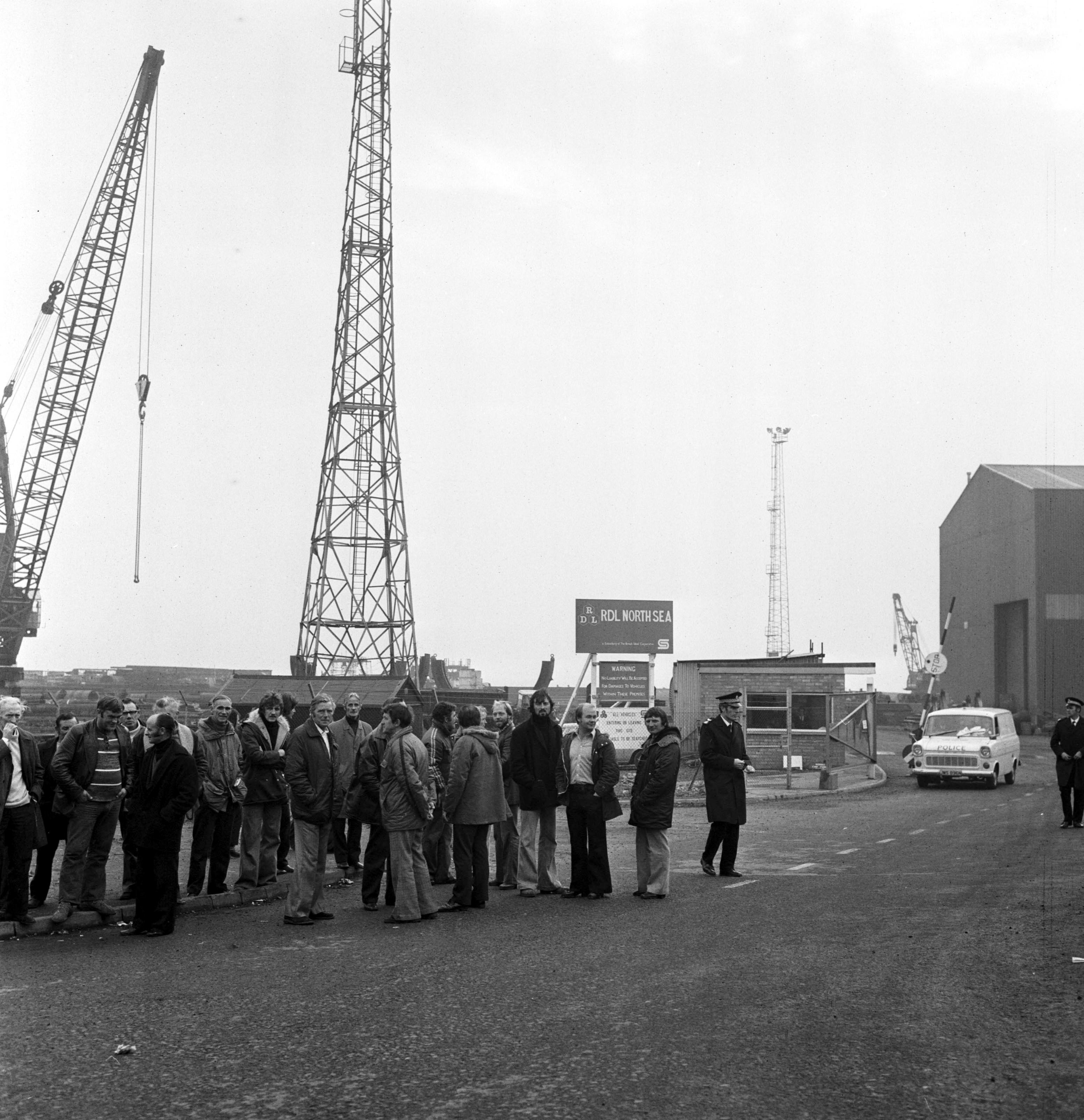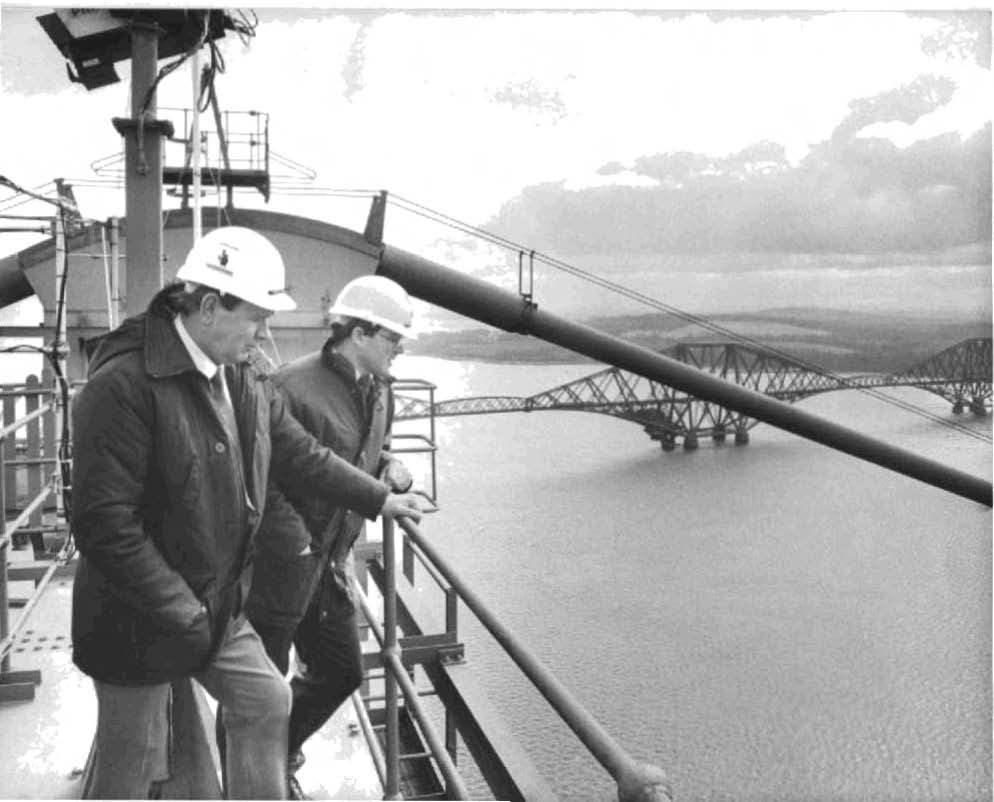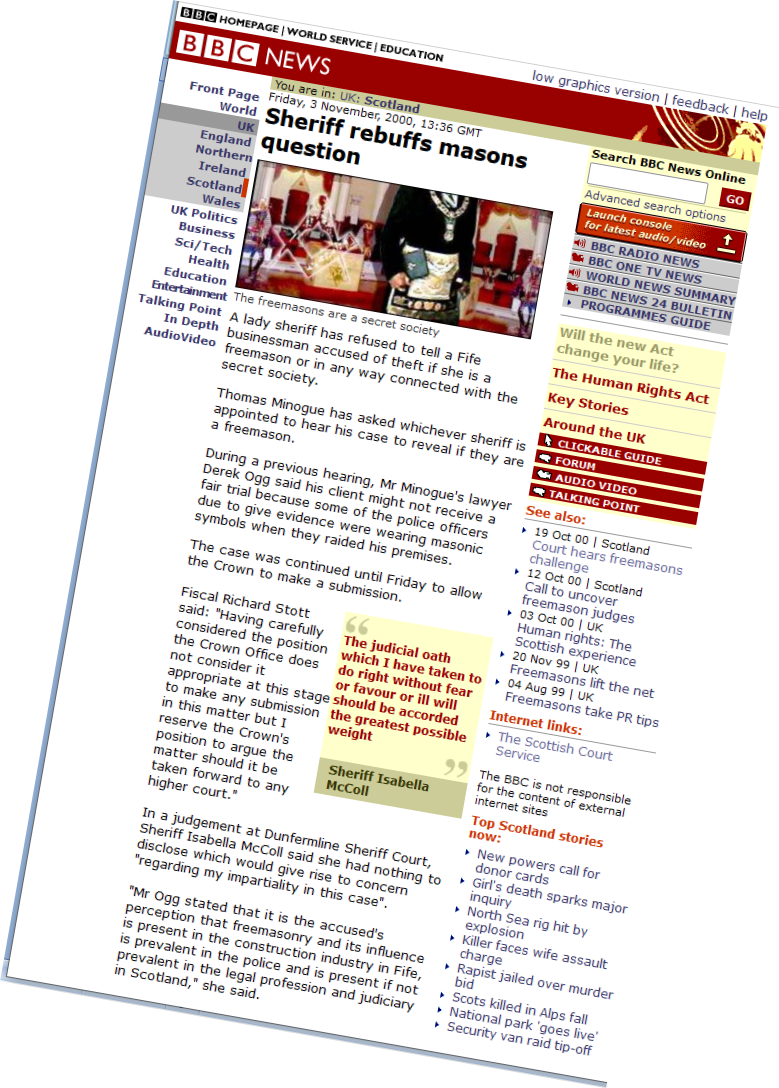Published on: Jul 17, 2021
In the previous blog I summarised my experiences of freemasonry during my working life ‘on the tools’, as being less than positive. But they didn’t dominate my thinking, as there were more good guys (Masons included) than there were bad/opportunistic Masons, and largely it seemed the good guys were non-Masons, individuals who stood on their own two feet.
The antipathy I now feel towards the organisation that is freemasonry didn’t really begin to fully develop until I started my own business in 1978.
Read on and if you wish to see my detailed reasoning click: “Further Detail”.
The beginning of the end of my life as an employee.
My days of working ‘on the tools’, mainly on trade union, National Agreement sites, were brought to an end following a strike at Redpath Dorman Long’s Methil yard in which I took part.

Above: Pickets on the gate at R.D.L. North Sea, Methil in 1976
The strike was unofficial and all of us who had taken part we were dismissed by the company, after which I was placed on a blacklist. This effectively meant that I was prevented from getting work on unionised, high-wage, major construction projects and was limited to working on smaller, non-union sites, which paid lower wages. Further Detail.
With life ending as an employee, I become an employer.
Following the strike at Methil, in 1978, I was working on one non-unionised site for a small Scottish construction company, Rutherford Stevenson, on outages at power stations and other industrial sites. While working at Cockenzie Power Station I stood in for a site manager who was on holiday for a month. Following this I was offered a middle management position with the company on a permanent basis. I accepted this offer and found my foray into management interesting, so decided to take the plunge by setting up my own steel fabrication and site welding company, Kingdom Engineering. Further Detail.
My embryonic company’s growth was helped by two brethren.
The first major contract Kingdom Engineering were awarded was as a sub-contractor to a major civil engineering company, Tarmac Construction, who were carrying out a major project in H. M. Dockyard, Rosyth, the place where I first started working when I left school. This was a stroke of luck for me and the two men I employed as were kept busy carrying out site welding. However in addition to site welding my employer had a need for some shop fabricated steelwork. Such fabrications necessitated special operations, such as drilling large diameter holes, work that I couldn’t do on site. In this regard my time spent as an apprentice in the dockyard stood me in good stead as I had many old friends there and two Driller brethren who were in the right place at the right time helped me greatly. Further Detail.
In Rosyth Dockyard, Kingdom Engineering, like Topsy, just growed and growed and I was made two interesting offers… but with no questions to be asked.
As my company’s workload grew in volume and expanded in scope it was evident that it needed to have fabrication premises properly equipped with specialised machines to meet the burgeoning demands of our main contractor. At this watershed, embryonic stage in my growing business I was approached, separately, by two men who worked in the Dockyard’s major steel fabrication workshops. They put a proposition to me that would help overcome my fabrication shortcomings. They offered to supply fabrications at knock-down prices on a “no questions asked basis”. One of these entrepreneurs was a Mason, one wasn’t. No prizes for guessing which offer I accepted…. the Masonic one. Further Detail.
The dockyard work comes to an end, but Kingdom Engineering break into the North Sea oil industry, and once again it’s thanks to an old friend.
The work on my first contract came to an end once the project was complete then I was lucky enough to secure some North Sea oil-related work with Kestrel Marine Ltd., Dundee, through an old workmate, who also happened to be a member of the Craft. Further Detail.
Over the next 20+ years Kingdom Engineering, prospered and grew into a well established and respected player on the Scottish industrial scene.
With two fabrication facilities, one at Cowdenbeath and one at Bo’Ness, servicing industry and construction sites mainly in Scotland as well as some in England, Kingdom peaked with a workforce of 240 and a turnover of £2.25 million. The company resumé read like a Who’s Who in industrial Scotland. Prestigious projects included major works on the Forth Road Bridge, The Queen’s residence in Edinburgh, Rosyth Naval Base, etc., to name but a few. Further Detail.

Above: Feeling on top of the world I view the Crossover steelwork fabricated & installed by my company which allows traffic to switch lanes on the Forth Road Bridge.
In September 1999 what was a purely commercial dispute between my company and a major civil engineering client led to me being charged with housebreaking.
What should have been a commercial dispute between two companies about the ownership of material used on the off-site refurbishing of a railway footbridge, became a criminal case when a main contractor (whose bank account I had arrested), with Masonic influence, enlisted the help of their brethren in the criminal justice system to do me down. Further Detail.
Tried and found not guilty of stealing a railway footbridge.
Much of the publicity attracted by my trial centred on the fact that I asked the male sheriff who sat during my first appearance in court to declare if he was a member of the freemasons, a question he didn’t answer, but instead passed my trial to a lady sheriff, to be heard at a later date.

My concerns regarding possible Masonic interest interfering with justice were assuaged by personal assurances from the lady sheriff who took my trial and found me not guilty of the charges brought, but she said the principle I had raised regarding Masonic declarations was one for the politicians. So my acquittal wasn’t the end of the matter as the extraordinary acts by the police and Fiscal against me convinced me to complain through my lawyers, but also take the lady sheriff’s advice so I raised a petition with the Scottish Parliament, requiring law officers to declare membership of organisations such as the freemasons. Further Detail.
Now retired, I have had time to take stock and reflect on how freemasonry affects business. After 25 years in business I had achieved much, in spite of being a non-Mason, but I am certain that I could have been even more successful, but for the corrosive and corrupting influence of freemasonry in industry.
To give some examples of what I mean:
Masonic corruption gives a chosen few firms returns of 100 to 1, or 110 to 1 their money.
My company carried out a variety of work almost always on a competitive tender basis. This system if administered properly should ensure that the client gets value for money, or in the case of Public works, the taxpayer.
In my experience corruption thrived in a cocoon of Masonic protection at H.M. Dockyard Rosyth after it was privatised. This resulted in taxpayer paying up to 100 times the going rate for some works and in one instance a £100,000 contract being let for £11million. That’s right this isn’t a typo! Further Detail.
Masonic influence corrupts local government.
I have no direct evidence that local government is corrupted by Masonic influence, but the circumstantial evidence in my own area of Fife suggests this is the case.
My perception is based on an expectation that a local authority headed by a CEO who is paid more that the Prime Minister should be very efficient, but in fact it is one of the most indebted and inefficient. So it is fair to conclude that something is wrong.
The massive council overspend on projects, the pot-holed roads, the town centres that deteriorate in tandem with large grants being given to the chosen few are symptoms that can’t be ignored, and coupled with the prevalence of Masons in prominent postitions with the local authority make me wonder if the two factors are linked. Further Detail.
The normal safety and quality assurance standards in the defence and petrochemical industries are waived to the benefit of the Mafia of the mediocre who otherwise couldn’t make it. This could, and probably will one day, lead to a disaster.
I have seen the rule book that was, quite properly, strictly applied to my company and others thrown out of the window when the brethren were concerned. It is my firm belief that Masonic cowboy companies are waved through, or given contracts on a handshake, despite not being qualified to work in hazardous industries such as the petrochemical plants at Mossmorran and Grangemouth. I firmly believe there is a good chance that this will one day lead to accidents with loss of life (& may have already done so in the past). Further Detail.
Masonic cops can help law breakers subvert the justice system to avoid prosecution
In my blog: “Experiences of freemasonry while working on the tools” I recalled my long boozing session with a Masonic mate who later in the same day was involved in an accident when the car he was driving knocked over a young woman who died.
He was never convicted of any crime. At the time I didn’t think too much about this, as although I knew he was as drunk as me, I thought that perhaps the breathalyser equipment may have been faulty or he had a constitution that processed alcohol in a different way to me, or whatever.
On reflection now, years later, and taking into account my own personal experience of Masonic miscreants avoiding drunk driving charges and boasting about it and other criminal acts, plus second-hand anecdotal evidence from reliable sources, if I heard of this man avoiding any sanction for the death today, I would immediately attribute it to positive Masonic bias cheating justice. Further Detail.

Jobs for the boys, if they’re in a lodge, or sometimes in the right lodge.
In some workplaces in the construction industry when recruitment takes place the man with the handshake will get the job first and only when the supply of brethren has been exhausted will non masons get started. Masonic preference is apparently dependent on the rank and mother lodge of masons too.
This was revealed to me by a valued and skilled engineering employee of mine, when with a downturn in orders meaning I might have to lay him off told me (when I warned him of this) that I shouldn’t worry, as he was guaranteed another job as a lorry driver delivering petrol from Grangemouth refinery, but it would mean he would have to join a Larbert lodge.
Another (Masonic) mate who always got into the right jobs where there was money or other benefits in kind to be had, told me of a lucrative position as a toll collector he was taking up, but it had to be through a Burntisland lodge, not the local one he was in.
Tanker drivers, toll collectors, football managers, miners and shop employees and engineering workers all benefit from membership of the craft, but at what cost? Further Detail.
Summary of my experiences of the corrosive effect of freemasonry in my experience.
Freemasonry destroys the efficiency of business and threatens their viability, it corrupts local government at a cost to the taxpayer, circumvents industry safety standards to the danger of us all. It also corrupts the criminal justice system allowing offenders to go unpunished.
I don’t doubt that other factors can do many, or all of these harmful things. Nepotism, bribery and corruption, can also thrive in societies where there is no meaningful Masonic influence, but in Scotland with the highest per capita Masonic membership in the world the preferment of the brethren and help of the brother in distress is as ubiquitous as it is harmful.
Masonic apologists will point to the fact that I can’t prove my theory. That’s true and if companies go into liquidation, local authorities rack up huge debts, petro-chemical plants explode and criminals defraud millions or kill with apparent impunity it is difficult to establish a causal link to freemasonry.
So if Mossmorran or Grangemouth exploded (as the latter has regularly in the past) tomorrow, you won’t find a compass & square in the twisted steelwork and smouldering rubble, or see Masonic regalia dangling on the padlocked gates of shipyards/industries that go into receivership, but the factors that lead up to the explosion, the spark that set it off, the lack of meritocracy that made the plant unsafe or uncompetitive, can, I believe, often have its genesis in a Masonic lodge.


